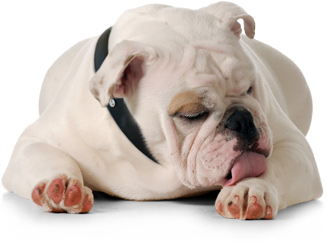FACTS ABOUT ALLERGIC ITCH IN DOGS
If your dog shows any of these common signs, they may have canine allergic itch. The good news is there are safe and effective treatments available. Talk to your veterinarian and learn about treatment options.
SIGNS OF ALLERGIC ITCH
- Frequent
scratching, licking, biting, or chewing - Excessive rolling, rubbing, or scooting
- Recurrent ear problems
- Hair loss, body odor, or skin changes
REASONS WHY YOUR DOG MIGHT BE ITCHY
Allergic Dermatitis (or skin allergies)
- Describes the signs of several skin diseases that are often caused by allergies in dogs
Flea Allergy
- An allergic reaction to flea bites that cause inflamed and itchy skin, hair loss, and scabs on the dog’s skin
- The hind end, tail base, and thighs are most commonly affected but lesions (skin changes) can develop anywhere on the body
Food Allergy
- Occurs when a dog’s body is allergic (or overly reactive or sensitive) to something in its diet
- Itching often involves the face, armpits, belly, and feet
- Skin infections as well as irritation and infection of the ears are common
- Dogs may have gas, increased bowel movements, or loose stools
Environmental Allergy (atopic dermatitis)
- In humans, eczema is a commonly used term for itchy, red, and inflamed skin
- Occurs when a dog's body is allergic (or overly reactive or sensitive) to pollens, dust mites, or mold spores
- Affected dogs often have itching, redness, and hair loss of the face, undersides, and feet
- Skin and ear infections occur frequently and ear rubbing or head shaking are common
Contact Allergy
- An allergic reaction to something that touches your dog’s skin
- Possible contact allergens include: household cleaners, shampoos, plants, and insecticides
Other Skin Problems
Bacterial Infections
- Can occur when a dog’s skin is inflamed and irritated due to scratching from allergic skin disease, or if their immune system is compromised
- Bacteria can multiply, leading to infection
- Signs include skin redness, crusts, scabs, rash, and pimples
Yeast Infections
- A type of fungal infection often seen in dogs with allergic skin disease
- Affects folded areas of the skin, such as face and lip folds, ears, under the neck, between the toes on paws, and under the tail
- Skin is often greasy, red, thickened, and has an odor
Hot Spots
- Focal areas of intense irritation that lead to redness and oozing
- Can appear very quickly and cause discomfort
DON’T WAIT TO TREAT YOUR DOG’S ALLERGIC ITCH
Get relief for your dog’s itch early. Waiting can lead to serious problems, such as:
- Continued itchiness, discomfort, and even pain from scratching-induced skin damage
- Hair loss, redness, odor or sores
- Secondary bacterial or fungal skin infection
- Disruption of normal activities for both dog and owner

TREAT YOUR DOG’S ALLERGIC ITCH
If you’re ready to relieve your dog’s itch, ask your vet if one of these prescription treatments is right for you and your dog:






